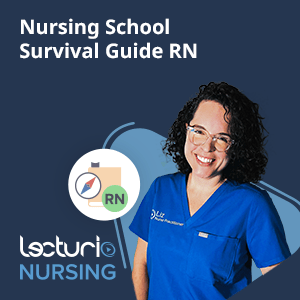Nursing Job Interviews
Any job interview is stressful, but after dedicating so much time to your education in nursing school, not to mention the work involved to pass that pesky NCLEX exam, you want to see your hard work pay off fast. While this is understandable, it’s essential to know what to expect in an interview as a new grad nurse, what should stand out as a red flag, and how to navigate unchartered territory as a new nurse looking for your first job.
In this post, you will learn about 5 red flags at interviews for new grad nurses.
Take the Course: Nursing School Survival Guide RN
Cover all topics concerning nursing school with Nurse Liz
5 Red Flags at Nursing Job Interviews
1. Huge sign-on bonuses
Picture it: two weeks after learning you’ve passed your NCLEX, you’re scrolling through a job board and find a posting for a $10,000 bonus at your local hospital for new grad nurses to work on their med-surg floor. It almost seems too good to be true, but you apply anyway and hope for the best.
Within 24 hours, the hiring manager calls you and requests that you interview the same day. You must think they are impressed with your GPA and clinical rotation experience, so you don your best business casual look and beeline toward the hospital’s HR department.
During the interview, they tell you they offer a $10,000 sign-on bonus. That all sounds too good to be true, doesn’t it?
It most likely is.
Before you sign on the dotted line, read the fine print. Most sign-on bonuses stipulate that you remain with the company, or even that same unit, for a specific time. If you leave, whether voluntary or not, you might be required to pay back the money pre-tax or face a lawsuit.
The likelihood of any facility offering a hefty sign-on bonus just because they’re nice is close to zero. There’s a reason they’re paying to hire nurses, and it’s usually because it’s not a great place to work.
If you encounter this red flag, consider your options carefully – you may find that running for the nearest exit is the best course of action.
2. No opportunity to shadow
Any employer worth their salt will allow you to shadow a current employee before you decide whether you want to work for them. There are two reasons for this.
The first reason is that it gives you a sense of a typical day on the job. As a new nursing school grad, you will benefit from shadowing as you start getting your feet wet and learning what nursing is all about in the real world.
The second reason is that it gives them a sense of you. Hiring managers will definitely speak to the staff you shadowed to learn more about your disposition, knowledge, personality, and whether you would be a good fit for their team.
The opportunity to shadow is a boon for both of you, so if it’s not something they offer, take it as a major red flag that they have something to hide.
Don’t wait to find out what it is – run!
3. High turnover
When you arrive at your much sought-after interview, pay special attention to who is interviewing you. Usually, your interviewers will tell you a little about themselves, such as their title, how long they’ve been with the company, and to whom they report. Are they new? Are they the interim supervisor? Or perhaps they report to an acting director?
These could be red flags. Companies that don’t have tenured staff in management positions typically have high turnover rates. You’ll probably want to wonder why. Luckily, the internet gives us much insight into employee satisfaction that previous generations would otherwise not be privy to.
Take advantage of websites like www.glassdoor.com or www.indeed.com and read what current and past employees say about employers before your interview.
Sure, every hospital and facility will have a disgruntled nurse or two leave a bad review now and then, but if the list is long or if people are constantly leaving for greener pastures, proceed with extreme caution.
4. No new-hire orientation program
During a nursing job interview, you should ask about their new-hire orientation program, how long it is, and if there is a preceptorship.
Most facilities have their new hires participate in a facilitator-led training program that may last from a few days to a few weeks. This will give you information about the company, its mission, how to use its EMR, and other essential items to orient you to your new position.
After this, you would typically be paired up with a preceptor to help you learn the ropes on the unit or in the field. This process is essential for new nursing grads to give you the best shot at success and help you gain experience to climb the career ladder and grow professionally.
An employer that does not offer an orientation program to new hires, let alone new grad nurses, does not believe in investing in their employees or the well-being of their patients. This is a huge, bright red flag that says you should run for the nearest exit!
5. Your gut tells you something is wrong
During a nursing job interview, you might feel like something is just off. If something feels wrong, you sense that they’re hiding something or not being level with you – trust yourself.
Maybe the hiring manager keeps bringing up the camaraderie in the unit as a benefit of the job. We want to get along with our colleagues, and we understand the importance of teamwork. It’s okay to hear this maybe once or twice in an interview, but if it’s repeatedly being brought up, you might want to ask yourself whom they are trying to convince – you or them?
If the facility you interview at isn’t clean, the staff appears to be miserable, or if you hear constant unanswered call bells – don’t stick around to find out why. This is not a one-off. I would bet money that it’s always that way. Don’t jeopardize your nursing license or set yourself up for burnout by ignoring these red flags.
Don’t Let Your Enthusiasm Cloud Your Judgment.
There is undoubtedly excitement and relief when you’re contacted for your first nursing job interview. Don’t let your enthusiasm cloud your judgment when considering whether to accept any job offer as a new grad.
Watch out for the red flags I described above, such as sign-on bonuses, lack of opportunity to shadow, no orientation program, high staff turnover, or a gut feeling that things don’t add up.
As you embark on your nursing career journey, practice discernment with whom you agree to work for so that you can protect your license – and your sanity.





